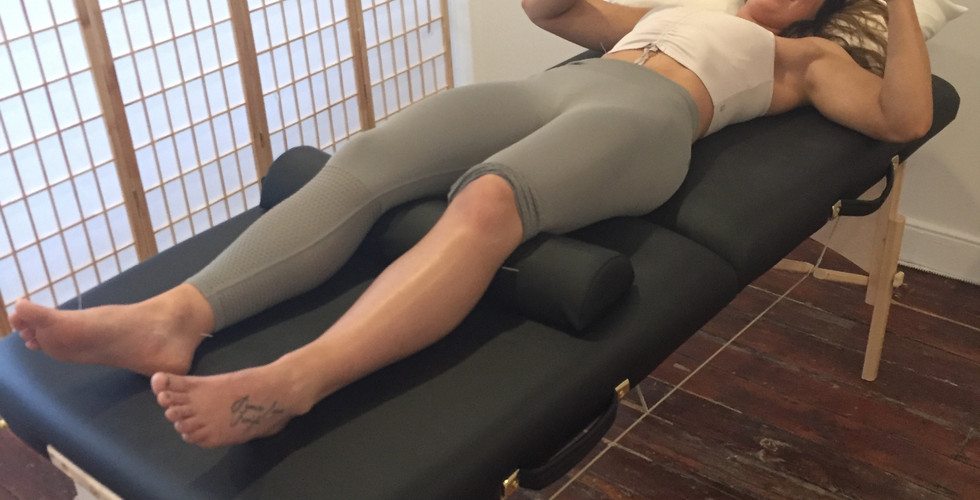Performance & Recovery: Part II- Acupuncture
- Maria Pro

- Feb 21, 2019
- 7 min read

When you think of acupuncture, what comes to mind? For me, that word was always associated with this mental image…

Acupuncture has been around for thousands of years, which has given it plenty of time to be misconstrued. One of the biggest misconceptions? That it hurts! ...I mean, how could it not? You’re getting needles poked into your body!!
I’m going to be honest, other than the fact that it involves needles, I never knew much about acupuncture. However, I did know that athletes all over the world were turning to it to help them avoid getting hurt and to promote recovery after injuries. Clearly acupuncture was worth it, even if it might be painful! This sparked a desire in me to learn a little more, and who better to help me on my educational quest than one of Philadelphia’s most beloved acupuncturists, Jason Krantz.

Jason is an Alternative Medicine Practitioner, Licensed Acupuncturist, and owner of his own practice, Summit Acupuncture, in Old City. With years of experience in acupuncture, and plenty of glowing client reviews, Jason was just the man I needed to enlighten me on one of performance and recovery’s hottest secrets.
Acupuncture 101
Before we could get into the great benefits of acupuncture as sports medicine, I wanted to take a moment to get the low-down on acupuncture as a whole. How does it work? What does it do? Does it really hurt?? Thankfully, Jason was able to clear all of this up for me:
“Acupuncture improves blood flow and releases a huge chemical cascade of neurotransmitters that reduce pain, inflammation, and stress (oxidative stress as well as mental stress). On a more local level, acupuncture can release knots within muscles as well as restore muscle inhibitions that occur from injuries, acute or chronic...In sum, acupuncture helps your body function properly, down to the cellular level, to ensure optimal health.”
Like Jason mentioned, acupuncture improves blood flow and reduces inflammation, this then promotes better sleep, lessens pain, aids in better digestion, and allows for more regular and less painful periods. All of which, Jason explained, are top reasons his clients come in for treatment.
Oh, and no, it does not hurt!!
When Jason told me this, I had a hard time believing it, especially being so needle-phobic, but I took his word for it and let him put in a needle to begin treating a tight rhomboid of mine (post-back day struggles). Within a second, he was standing in front of me again- “Wait, that was it?”
It sure was, and soon after I realized I actually could handle it, I was laying on the table looking like a human pin cushion and feeling no pain whatsoever!
Coming from the girl that nearly faints anytime she has to get blood taken, this was a BFD and quite the accomplishment ;)
(...and in case you need little extra convincing that he's telling the truth, here's Jason with more on the topic: "Acupuncture does not hurt. Most patients find the treatment virtually painless. As some needles are inserted there is a small pinch but that’s about it. The needles used are filiform, which means there is no hole to inject medication like hypodermic needles used for shots. They are much thinner than the needles patients are used to at the doctors office, in fact you can fit multiple acu needles in the head of a hypodermic needle. I’ll add that many people are afraid of Acupuncture and as soon as they are treated, realize that it’s not a big deal at all. I’ve never had a patient leave the office because they were afraid of needles. Patients do very well especially once they realize how great acupuncture makes them feel.")
Performance & Recovery
The advantages of acupuncture that Jason mentioned are obviously beneficial to all humans, athletes included, but how do those benefits specifically play into athletic performance and recovery?
Let’s first start by thinking about performance and what happens during it. When athletes perform, they put stress on their muscles and become more susceptible to injury. Injuries create an imbalance in the body’s proprioceptive system (the system which allows the muscles to communicate with the nervous system).
Going back to that first point mentioned by Jason, acupuncture improves blood flow, an element essential to restoring proprioception. When blood flow improves it, in turn, erases fatigue, inflammation, strain, tightness, and soreness and restores muscle balance. This “balance reset” then helps the body heal faster between workouts. “This is why I stress to my patients the importance of treatment ASAP after an injury occurs,” Jason added.

Former Jets' fullback, Tony Richardson, receiving acupuncture treatment in New York courtesy of New York Magazine
Jason also noted that acupuncture creates a release of the ‘feel-good’ neurotransmitters which help to “down-regulate our sympathetic nervous system and improve our sleep quality”. With sleep playing such a vital role in both performance and recovery, this sympathetic down-regulation for high-quality sleep is essential to every athlete.
The role acupuncture plays on sympathetic (“fight or flight” system) and parasympathetic (“rest and digest” system) nervous systems is crucial. It is what brings the body back into balance so we are better able to perform and heal, and millions of athletes around the world are reaping the “balanced benefits” and operating at their fullest potential.
“In my extensive off-season workouts, I have noticed a difference in my balance and agility since receiving [sports acupuncture] treatments...I feel my muscles have been ‘turned on’ and are firing on all cylinders.” -Will Demps, Baltimore Ravens safety
Jason knows a thing or two about helping his athletes “fire on all cylinders”. He uses specialized orthopedic tests on the shoulder and hip girdle to ensure just that: that their muscles are firing properly. “When someone comes in for this, before pain is present, we can reduce the risk of injury in the future. When muscles become inhibited this can cause pain immediately or somewhere down the line. By using these tests to isolate the exact muscles that aren’t firing properly, we can restore function and proprioception and ensure proper movement and strength in the gym.”

Jason using electroacupuncture on an under-active deltoid of mine
It’s not all about the muscles, though. Acupuncture also ensures our brains are firing on all cylinders! It can actually reset the brain’s peripheral nervous system in order to stop the signals that lead to chronic pain; also triggering the release of endorphins, our own endogenous pain killers.
According to the World Health Organization, “Acupuncture’s effective rate in the treatment of chronic pain is comparable with that of morphine.” In fact, Jason pointed out a peer-reviewed study recently released that showed people in the ER got more relief from acupuncture than morphine! Crazy, right?

“Research aside,” Jason started, “most Western docs often don’t know why people are in pain because they usually don’t put their hands on the patient. Instead, they offer prescription painkillers as a bandaid for the pain. In a majority of cases, prescription medications for pain are not fixing anything. They relieve the symptom but don’t fix the cause. On top of this, we have the risk of addiction, side effects, and a never ending cycle of pain that doesn’t resolve. With acupuncture we actually put our hands on the patients to assess properly and find the root cause of the pain. Most patients walk out of their first treatment with a huge reduction in pain. After a series of treatments pain goes away long term. And, for the few that don’t get relief, there’s no side effects, so no harm done. For the majority that do get relief, they are able to avoid prescriptions and OTC meds that affect our bodies in very negative ways. That said, I’m not anti-western medicine, but I do think there needs to be more integration of natural medicine for the benefit of the patient.”
Acupuncture does more for the mind than merely acting as a natural painkiller, it also helps athletes get their heads in the game!
Think about the pressure that comes with performing or competing at a high-level. Stress, anxiety and nervousness are common for athletes across all disciplines. These emotions create a host of physiological responses in the body such as increased heart rate, muscle coordination/timing, respiration rate, and muscle fatigue. Acupuncture releases chemicals in the brain that are conducive to a focused mind and relaxed body. It helps athletes achieve a mindset for success, allowing them to adapt to the physical and emotional demands of their sports.
The Bottom Line
Acupuncture restores balance to the body on so many different levels, allowing athletes to better perform and recover. It allows them, and everyone else, the ability to maintain optimal physical and mental condition and is a very powerful tool for overall well-being.
...and it doesn’t hurt ;)

Thank You
A big thank you to Jason Krantz of Summit Acupuncture for the knowledge bombs and treatment! I’m happy to report that I came to Jason with a few nagging sports-injuries, all of which have been resolved within 1-3 sessions. As well, he has been working with me to help keep my difficult-to-please digestive system moving along! I can 100% attest to all the points discussed in this post as acupuncture has been working for me, too-- both as an athlete and as a regular, ole human.
If you are interested in acupuncture for performance and recovery, as well as for overall health, I highly recommend giving it a try. If you are in Philadelphia, go check out Summit! If you are elsewhere, begin looking up reputable acupuncturists near you and remember to do your research first-- read reviews, ask around, call and talk with the staff-- find an acupuncturist that specializes in your needs.
Final note from Jason: “I personally specialize in the treatment of pain, migraines, and stress disorders. I do treat a wide variety of issues and love to take on odd cases that western medicine has no clue about. Some of my favorite cases come from patients who are told they can’t be fixed and with an assessment through the lens of Chinese medicine, the issue becomes treatable and patients do very well. I want to stress that I strive to be a resource for anyone, especially people in Philly. If I can help you in any way, please don’t hesitate to reach out. I would love to connect!”












Comments